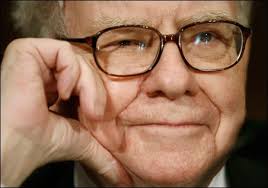Behind Warren Buffett’s Cable Deal
The smarter way to stay on top of the multichannel video marketplace. Sign up below.
You are now subscribed
Your newsletter sign-up was successful

Legendary investor Warren Buffet could get control of Graham Holdings’ television assets — including Phoenix-based cable operator Cable One — in a deal that would allow the billionaire a profitable and tax-free exit from the media conglomerate.
According to a Feb. 12 filing with the Securities and Exchange Commission, Buffett’s Berkshire Hathaway is in talks with Graham Holdings — formerly The Washington Post Co., and renamed after the Graham family sold the flagship newspaper to Amazon founder and chairman Jeff Bezos last year — about “possibly acquiring an as yet unformed subsidiary” that would consist of certain unnamed assets in exchange for Berkshire’s $1.1 billion interest in Graham.
The deal would be a tax-free exchange, which could save Berkshire a bundle. According to several reports, Berkshire originally bought the Graham Holdings stake in 1973 for $11 million. Berkshire currently owns 1.7 million shares of Graham Holdings, or about 27.8% of the company’s outstanding stock, according to SEC filings. The shares were priced at $659.52 each on Feb, 19, down 0.3% or $1.67 apiece.
In a statement, Graham Holdings said the makeup of the spinoff hasn’t been determined. “As indicated in the filing, the parties are in discussions and have not reached an agreement on terms of a potential transaction, and the parties may not reach such agreement,” Graham said in a statement. “No transaction will be consummated unless it is in the interest of both parties.”
Graham Holdings spokeswoman Rima Calderone said the company would have no comment beyond its statement.
Graham Holdings has been divesting assets — it sold The Washington Post to Bezos last year for about $250 million. Graham’s current holdings include six television stations in Detroit; Houston; Miami; San Antonio, Texas; Orlando, Fla.; and Jacksonville, Fla.; Cable One, which has about 561,119 video customers in 19 states; Kaplan Education; advertising technology company Social Code; publications Slate, The Root, Foreign Policy and Trove; utility monitoring company Forney; and healthcare provider Celtic Hospice & Home Health.
According to the filing, the assets that would be included in the spin have not yet been determined, and the deal might never come to fruition.
The smarter way to stay on top of the multichannel video marketplace. Sign up below.
Buffett could be more inclined to accept the publishing assets — he has snapped up several print newspaper groups on the cheap over the past few years, like Media General and six Nebraska newspapers, including the Omaha World Herald.
The cable assets may be worth too much to justify their inclusion in the spinoff — a conservative valuation of seven times 2013 estimated cash flow of about $300 million would place Cable One’s value at about $2.1 billion.
But Buffett is no stranger to cable. Back in 1999, Berkshire Hathaway bought an 8% stake in TCA Cable, a publicly traded smallmarket operator based in Tyler, Texas. TCA, which had about 883,000 customers in the South, was one of the first cable companies to show positive net income, one of the main reasons for Buffett’s attention. It was sold to Cox Communications in 1999 for $3.3 billion.
Buffett and Berkshire have been quietly amassing a portfolio in multichannel TV over the past three years, however. According to SEC filings, Berkshire began buying stock in satellite giant DirecTV (4.2 million shares) and Liberty Media (1.7 million shares) in 2011. The fund has since beefed up those positions to 36.5 million shares and 5.3 million shares, respectively. Berkshire also owns about 7.6 million shares of Viacom stock — it first starting investing in the programmer in 2012 with 1.6 million shares.
A spokeswoman for Cable One defer red comment to Graham Holdings. Berkshire Hathaway senior vice president and chief financial officer Marc Hamburg did not return calls for comment.
